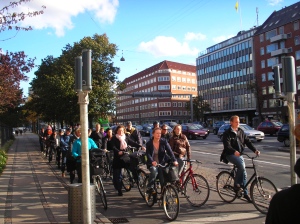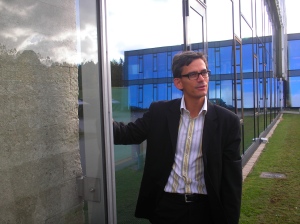Danish Minister for Climate and Energy Connie Hedegaard said she came home one day last February to find her teenage son painting a giant mural of Barack Obama on his bedroom wall. The painting, she said, should be a symbol for Americans of just how much hope the new president has instilled in the rest of the world.
“How many years is it since you had an American president that a new youth generation, not only in Denmark, not only in Europe, in Asia, in Africa … who through his presidency has allowed hope in the United States?” said Hedegaard. “It’s fantastic that a new generation of youth worldwide sees this new hope in American leadership.”
“I know all the troubles back home on your domestic scene,” she continued. “But those of us who love the US, it is a fantastic and unique possibility of reinventing the American strong position in the world.”
Hedegaard noted this in a meeting with a small group of American reporters here in Copenhagen on Friday, just minutes after word hit the press that Obama had won the Nobel Peace Prize. Denmark, like the rest of the world, is abuzz about the award. Like many Americans, I’m befuddled by the choice. While I hope that he may some day earn such a prize, I’m not sure that he’s done anything in his barely nine months in office that would merit this honor.
On climate change in particular, I’m rather surprised by the credit he’s getting. The prize committee stated, among other reasons, that, “Thanks to Obama’s initiative, the USA is now playing a more constructive role in meeting the great climatic challenges the world is confronting.” Hedegaard, Danish leaders, and the average Danish citizens I’ve met here also seem to be giving him quite a bit more credit than is deserved on this issue.
I was disappointed by his recent speech at the UN on climate, and I’ve been disappointed by the administration’s unwillingness to take a hard line on climate policy or even prioritize it, considering there’s a major international summit coming up in 60 days. We’re well past the point where “playing a more constructive role”—i.e., not denying climate change is happening, actually talking about the issue—is adequate.
The rest of the world has committed. The Danes, like other EU nations, are on board to cut carbon 20 percent below 1990 levels by 2020, and could go to 30 percent if they get wider cooperation. Norway, at this week’s UNFCCC meeting, said they would cut emissions 40 percent by 2020, conditional on the outcome at the Copenhagen summit, and 30 percent even without a stronger deal. The Japanese government has committed to 25 percent cuts. Even China is now willing to commit to at least a quanfiable reduction in greenhouse gas emissions.
It seems like the past 8 years have moved the bar extremely low for the US on climate. European leaders aren’t asking the US to commit to cuts nearly as steep as what they’ve outlined. Hedegaard was fine with the fact that the House bill, the only carbon cutting plan the US has passed so far, only calls for cuts of 17 percent below 2005 levels of carbon dioxide. That’s just a 3 percent cut below the 1990 baseline that the rest of the world is using. But expectations for the US are so low that even that is acceptable.
“The rest of the world is not ignorant of the challenges that the US political leaders face,” said Hedegaard. “What the rest of the world just asks from the US is you must be as much into this as the rest of us. We understand your challenges and your problems. Don’t believe it’s easy for the rest of us. But you must take your fair share of responsibility.”
Hedegaard did caution that Obama needs to have something to show here in December if he’s to live up to the promise of the Nobel and the expectation of young people around the world like her son.
“That is what is at stake here. If the United States comes to Copenhagen and says we cannot deliver, I’m not sure whether that picture on the wall will be scrubbed away again,” she said, “but I think that there is the possibility for the US to take this leadership position in the world that has been a traditional role for the Americans to have.”
And what was her top request for Obama for the December summit?
“He should show up.”







